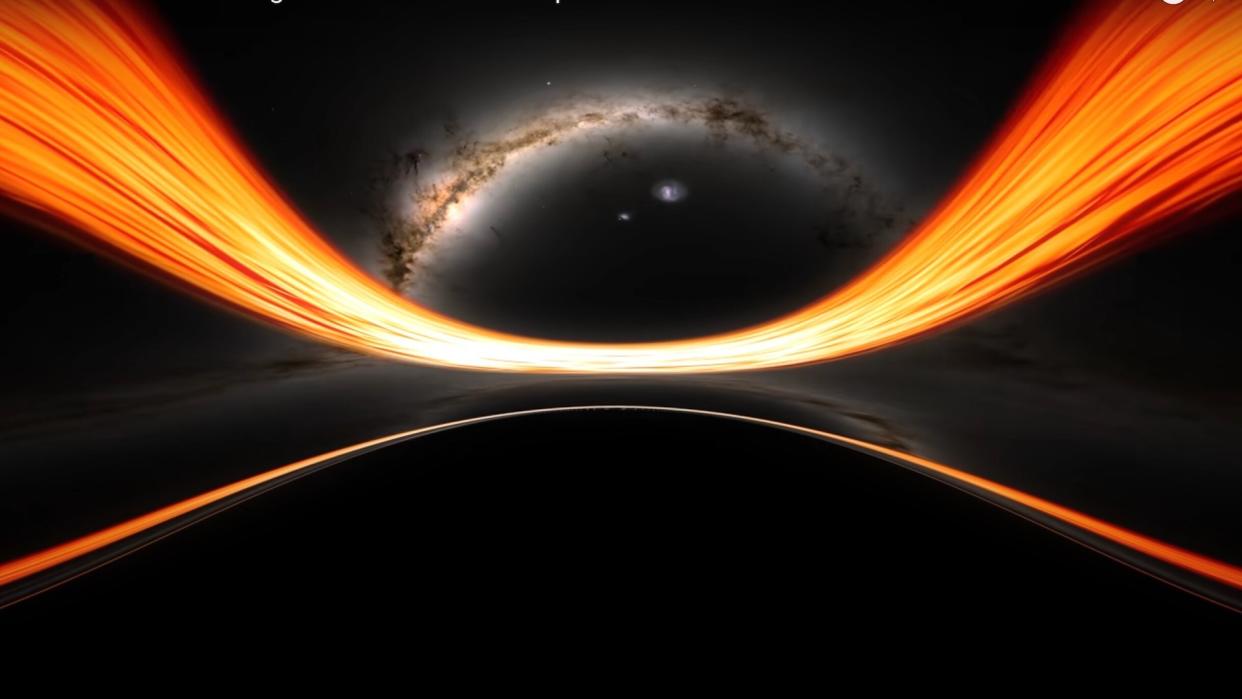Newfound 'glitch' in Einstein's relativity could rewrite the rules of the universe, study suggests

- Oops!Something went wrong.Please try again later.
A strange "cosmic glitch" in gravity could explain the universe's weird behavior on the largest scales, researchers suggest.
First formulated by Albert Einstein in 1915, the theory of general relativity remains our best and most accurate understanding of how gravity works on medium to large scales.
Yet, zoom out even farther to view enormous groups of gravitationally bound galaxies interacting, and some inconsistencies appear to emerge. This suggests that gravity, which is theorized to be a constant across all times and scales, could actually become slightly weaker at cosmic distances.
In a study published March 20 in the Journal of Cosmology and Astroparticle Physics, researchers described this discrepancy as a "cosmic glitch," and they say their proposed fix for it could help us understand some of the universe's most enduring mysteries.
"[It's] like making a puzzle on the surface of a sphere, then laying the pieces on a flat table and trying to fit them together," study co-author Niayesh Afshordi, a professor of astrophysics at the University of Waterloo in Ontario, told Live Science. "At some point, the pieces on the table will not quite fit each other, because you are using the wrong framework.
"The glitch is the smoking gun for a fundamental violation of Einstein's equivalence principle (or Lorentz symmetry), which could point to radically different pictures for quantum gravity, the Big Bang, or black holes," Afshordi added.
Cosmos for concern
Einstein's theory of general relativity is remarkably good at describing the universe above quantum scales, and it has even predicted other aspects of our cosmos, including black holes, the gravitational lensing of light, gravitational waves, and the Big Bang.
Yet some discrepancies between theory and reality remain. First, attempts to scale down general relativity to describe how gravity operates on quantum scales transform its usually robust equations into incomprehensible nonsense.
Second, completing our current model of the universe required the introduction of two mysterious additions, known as dark matter and dark energy. Believed to make up most of the contents of the universe, these entities have never been directly detected and fail to explain why our cosmos is expanding at different speeds depending on where we look.
In response to these problems, the authors of the new paper came up with a simple suggestion: a tweak to Einstein's theory at different distance scales.
"The modification is very simple: We assume the universal constant of gravitation is different on cosmological scales, compared to smaller (like solar system or galactic) scales," Afshordi said. "We call this a cosmic glitch."
Afshordi said this tweak makes changes to patterns found in the cosmic microwave background — the leftover radiation produced 380,000 years after the Big Bang — and in the universe's structure and expansion. These adjustments are subtle, but the implication that the laws of gravity change over distance scales could be profound.
"We find evidence for the glitch: cosmic gravity is about 1% weaker than galactic/solar-system gravity," he added.
RELATED STORIES
—Mysterious 'unparticles' may be pushing the universe apart, new theoretical study suggests
—'It could be profound': How astronomer Wendy Freedman is trying to fix the universe
—James Webb telescope discovers oldest black hole in the universe
The researchers said the glitch's existence could be confirmed by next-generation galaxy surveys, including those performed with the European Space Agency's Euclid space telescope, the Dark Energy Spectroscopic Instrument and the Simons Observatory. They say that these instruments should make measurements of the glitch four times more precise than is currently possible and, therefore, confirm or rule out their theory.
However, some scientists say a simple modification of Einstein's relativity might not be enough. In fact, it's possible that the discrepancies revealed by astronomical observations are hints that our understanding of the universe needs a complete rewrite.
"It's not that surprising that this new model is a slightly better fit to the data, but maybe that is telling us something," said Scott Dodelson, a professor of physics and the chair of the physics department at Carnegie Mellon University, who was not involved in the study.
"If so, it means we understand even less than we thought we did," he told Live Science. "My hunch is that instead of adding more new stuff, we need a new paradigm. But no one has come up with anything that makes any sense yet."

